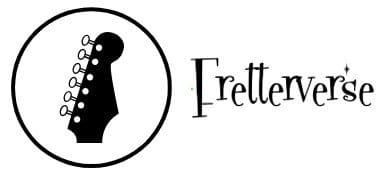Imagine standing on stage, guitar in hand, about to hit the first chord and thrill the audience with an unmistakable Leslie sound for guitar. That dream is now a tangible reality, thanks to the ingenuity of the Leslie guitar pedal. This is Robert Williams and welcometo my in-depth exploration into this remarkable feat of engineering!
As a seasoned player, I never imagined I’d find such a profound change in tone and feel until I plugged into a Leslie pedal. That whirlwind of sound, once locked inside a mammoth Leslie speaker cabinet, now rests comfortably on my pedalboard, spinning the room around with every note. How did it radically alter my soundscape? Well, that’s a journey I’m excited to take you on.
Yet this isn’t just about my experience. In my thorough analysis, I’ll shed light on popular models like the Hammond Digital Leslie Pedal and the Strymon Lex, grapple with user-friendly options like the Boss RT20 and scrutinize underdogs like the Neo Ventilator. From understanding rotary speaker effects to sound impact, we’ll dive headfirst into the world of Leslie sound for guitar. Buckle up as we tune into the captivating and complex realm of Leslie guitar pedals!
Understanding Leslie Pedals
Leslie Cabinet Simulation and its Impact on Sound
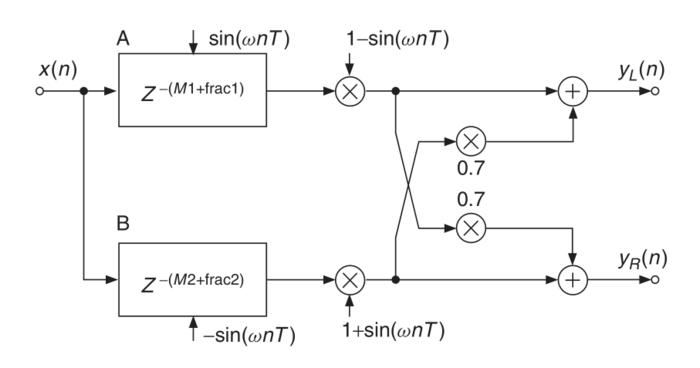
As a transcriber and engraver, I’ve learned to appreciate the subtlety of various guitar effects and how transformative they can be. One particular effect that always captivated me is the Leslie sound for guitar. The magical thing about it is its inherent ability to transform the tonal quality, adding a mesmerizing layer of warmth and richness. However, being able to recreate this magic with the accuracy it deserves requires us to delve deeper into the Leslie cabinet simulation.
Leslie cabinet simulation is a method adopted by pedal producers to emulate the defining aspects of the original Leslie cabinet – the rotating speaker system. Using digital algorithms, these pedals are designed to replicate the unique interaction of the rotating speaker’s direct and reflected sound wave—resulting in the iconic Leslie sound.
What’s fascinating about this is that the complex yet soulful auditory experience of a Leslie cabinet – an originally keyboard-based technology – is made accessible to a guitarist. It does so by capturing the distinctive tonal variations, speed fluctuation effects, and the overall dynamism associated with the physical motion of the rotating speaker. This grants guitarists the ability to experiment and expand their sonic palette with an all-new level of versatility.
From the parent category perspective, understanding the Leslie pedal’s functionalities is heavily ingrained in the principles of Leslie cabinet simulation. The influence it holds on sound is significant, defining a myriad of immersive soundscapes that can entirely mold a musical piece. This is a testimony to its intrinsic relevance in discussions surrounding Leslie pedals. Transcribing music involving the usage of these pedals requires both a practical and nuanced understanding of Leslie cabinet simulation.
So, as we continue our journey through the realm of Leslie guitar pedals, let’s dive into another crucial component that makes these pedals what they truly are – the Rotary Speaker Effect in Guitar Pedals.
Understanding Rotary Speaker Effect in Guitar Pedals
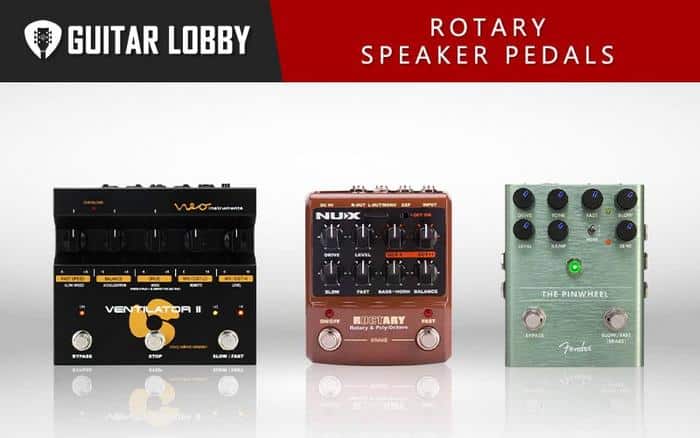
Immersing myself into the enchanting world of the rotary speaker effect has always intrigued me, offering an extraordinary palette of lush, deeply immersive sounds. A fundamental element of our study is to understand the relevance of this effect as it directly relates to our broader exploration of Leslie pedals.
The rotary speaker effect was first introduced by the Leslie rotating speaker, replicating the distinctive sound produced by its revolving horns. This sound, once exclusive to the organ, was soon adapted into pedals for its rich, vibrant character, opening new realms of possibility on guitar. The resulting effect adds a swirling, three-dimensional character to the guitar’s tone, delivering a sound that’s as entrancing as it is unique.
Within the heart of Leslie pedals, the rotary speaker effect is the primary element that imparts that characteristic lush Doppler effect and incessant tremolo. Although numerous pedals attempt to capture this captivating sound, not all succeed in delivering the same mesmerizing, deeply authentic spins.
Sourcing the finest Leslie pedals, the ones that seize the genuine essence of the rotary speaker effect, requires a discerning ear and in-depth knowledge. My fascination and experience with these pedals have endowed me with the skills and understanding to evaluate them effectively, guiding you through the wide array of options available on the market.
As we delve further into exploring and comparing Leslie pedals, this insight into the rotary speaker effect lays an informed foundation to aid our understanding. In doing so, we equip ourselves with the crucial knowledge needed to distinguish the truly remarkable pedals from the rest, ultimately finding the one that perfectly resonates with our unique musical voice.
Popular Leslie Pedals Review
Review: Hammond Digital Leslie Pedal
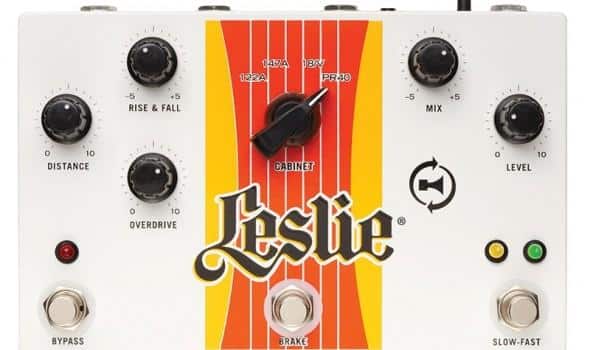
Moving through our tour of popular Leslie pedals, let’s delve into the world of Hammond with the Hammond Digital Leslie Pedal. If authenticity is what you’re after, then this pedal, a masterpiece in encoding Hammond’s incomparable organ cabinet impressions, is hard to beat. I was immediately taken in by its tonal resonance, mirroring the multidimensional, shifting aural experience of a physical Leslie speaker.
Out of the various guitar pedal reviews I have done, the software-driven design and ‘Mix’ knobs on the Hammond Digital Leslie make it a standout. These features allow fine-tuning of dry and wet signals to create a panoramic soundscape. Whether you’re recreating the growly crunch of a guitar, the soulful wail of an organ or even the breathy whispers of a wind instrument, this pedal has the flexibility to accommodate.
The Hammond Digital Leslie Pedal does command a premium price, but for the richness and quality it offers, I’d argue it’s worth every penny. This pedal not just stimulates, but elevates the sonic identity of any instrument plugged into it.
Onwards to our next sonic gem,
Review: Neo Ventilator
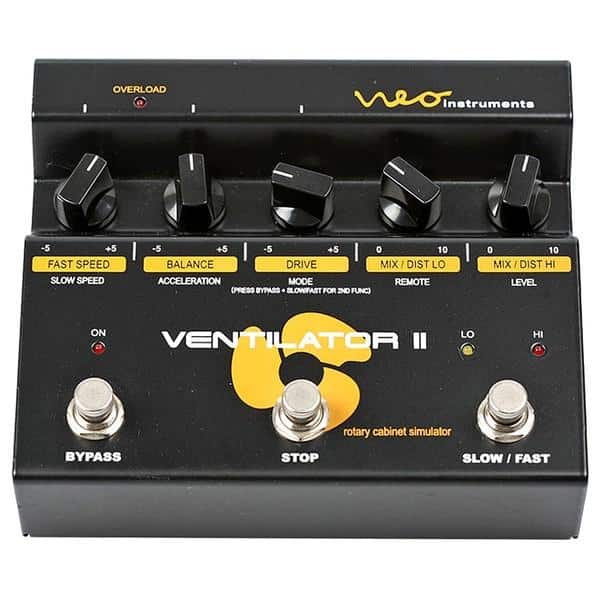
Transitioning from the Hammond Leslie pedal, I’d like to share my personal experience and professional insights into the Neo Ventilator. Exploring this tool falls under the ‘desire’ stage of the AIDA model as it lures serious musicians seeking high fidelity and professionalism.
In my time reviewing guitar pedals, Neo Ventilator stands out as one of the top contenders in the Leslie-Style pedals category. Its broad range of controls offer expert precision for tailoring your sound. One noteworthy feature is the ability to adjust both slow and fast speed settings on-the-fly, providing flexibility during performances.
The core strength of the Neo Ventilator lies in its ability to emulate the dynamic sound of a Leslie cabinet in a compact, pedal format. As you may recall, we discussed the importance of this in our ‘Leslie Cabinet Simulation and its Impact on Sound’ section. This pedal delivers an authentic rotary response that competes impressively against its peers.
Moreover, the Neo Ventilator incorporates a sophisticated digital signal processing engine. This engine accurately captures the nuances of a physical Leslie speaker, creating a three-dimensional sound image that is seldom found in other pedals. It’s fair to say that this pedal offers an authentic Leslie experience without the bulk and maintenance of a cabinet.
As we delve more into other Leslie pedals reviews, you’ll appreciate how the Neo Ventilator sets a high standard. Its contribution to this category is compelling evidence of the exciting evolution in this realm of sound.
Review: Boss RT20
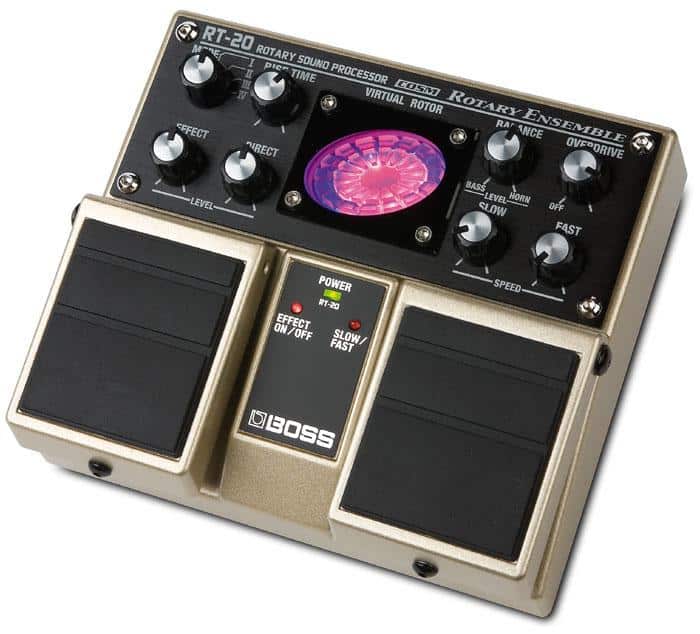
Transitioning from the intricacies of rotary speaker effects, it’s fitting to speak on the Boss RT20, a strong contender in our review of popular Leslie pedals. As of my first-hand encounters with this remarkable piece of gear, spanning across my decades of guitar pedal reviews, I can affirm that it’s worth attention and praise.
The Boss RT20 captures the idiosyncratic allure of the Leslie speakers impeccably. It brings a reliable balance of versatility and authenticity that distinguishes it from other contenders. What makes it stand out are its strong characteristics. Its features include dual outputs, four sound modes, an overdrive function, visual display, and extensive control versatility. This scope of functionality and adaptability remains unrivalled in the context of Leslie cabinet simulation pedals.
But it’s not just about the hardware
In the grand scheme of Leslie pedal reviews, the Boss RT20 is a definite heavyweight, offering extended dimensions to your sounding realm. Its relevance within popular Leslie pedals review is well-deserved and quite frankly, practically indispensable. Trust me, your pedalboard will thank you.
Up next, let’s explore another titan in the realm of Leslie pedals—the Strymon Lex.
Review: Strymon Lex
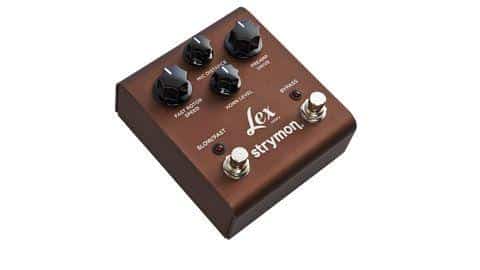
My foray into the world of Strymon Lex has been a vivid journey of tonal exploration. As part of my quest to understand and give thorough guitar pedal reviews, I found the Strymon Lex to be a standout in the ‘Popular Leslie Pedals Review’ category.
Strymon Lex offers a sophisticated, analog-modelled sound in a compact, pedalboard-friendly format. With its authentic rotary speaker effect, it lures you in and takes your sound to a whole new dimension.
Operating the Lex, I experienced an immersive, organ-like tone, reminiscent of the classic Leslie speaker cabinet. And the best part? Its four-knob control layout ensures intuitive sound sculpting, rewarding me with rich, musical swirls. I was tremendously impressed by its ability to offer a realistic Leslie effect through its combination of speed, horn level, microphone distance, and preamp drive.
The options go on with the secondary functions, which further enhance the flexibility and precision of this pedal. Offering reverb, cab direction, brake speed, and more, the Lex truly brings a powerhouse of rotary speaker emulation to your pedalboard.
As we move forward in our review, you’ll see how Strymon Lex, with its superior sound quality and customization, provides an unparalleled contribution to the world of Leslie guitar pedals. Stay tuned for a comprehensive comparison of these pedals and an in-depth look into other major contenders in the field.
Comparison and Shootout

There’s nothing that excites me more than a good old-fashioned shootout between some top-notch gear! It’s in these high pressure, make or break moments that I find a unique clarity. The meticulous evaluation and juxtaposition of these tools illuminate their strengths and weaknesses unmistakably. For this review, I’ve painstakingly evaluated the best Leslie pedals for guitar available in the market. Each pedal brings its unique selling points and colorations to the playing experience.
I must admit, there’s a particular pleasure in teasing out the subtle nuances, peculiar tonalities, and character of each device. The Rotary Speaker Simulator has been my playing field for some time now, as part of my constant quest to find the most authentic, luscious, and robust sound. The trials and tribulations, the endless tweaking and retweaking, have been a labor of love. Each sound wave carved and molded painstakingly, echoing off the floor walls, the ceiling, persisting in my mind long after I unplug my guitar.
Stepping into this rotary speaker pedal shootout felt like heading into a candy shop, the overwhelming array of choices as intriguing as they were daunting. However, rather than feeling timid, I was thrilled at the prospects lined up before me. Comparing models like the Neo Ventilator or the Strymon Lex, Hammond Digital, and the Boss RT20 carved a new understanding and perspective on the Leslie pedal landscape.
So, as we all wait with bated breath, let me pose the question that’s on everyone’s mind—Which one wins the clash of titans when we line up these power-packed Leslie pedals?
To put it simply, each pedal brings something unique to the table, boasting a specific cocktail of features, tones, and usability. In the world of music, words like ‘best’ are often extraneous and subjective. Different pedals appeal to different individuals based on a plethora of unique variables. Some would argue that the Boss RT20 has mastered the art of versatility, while others might swear by the raw power and dynamism of the Strymon Lex.
However, amongst all the stellar contenders, one pedal which I personally feel stands out is the Neo Ventilator. It consistently reproduces a warm and realistic rotating speaker effect and pays homage to the classic Leslie sound. The dynamic response and attention to detail in the sound production made each strum feel like a luxurious journey. But, of course, this is my personal preference and not a universal rule.
In the end, it all comes down to one’s unique needs, stylistic preferences, and budget considerations. So when it’s time for you to choose your best Leslie pedal for guitar, bear in mind my experiences and insights. But don’t let them overshadow your own judgment and ear. After all, the beauty of music is its universal yet deeply personal nature.
Armed with the knowledge from our in-depth reviews, the understanding of Leslie pedals, Rotary speaker effects, the workings of Leslie cabinet simulation and its impact on sound, let’s tread further into the deep and fascinating world of guitar pedals in the next section. I can’t wait to share what’s up next!
FAQs
What are Leslie Guitar Pedals?
What makes Leslie Guitar Pedals special?
Which are the top-rated Leslie Guitar Pedals?
How to choose the right Leslie Guitar Pedal?
Conclusion
Having explored the diverse capabilities of Leslie guitar pedals, it’s clear they hold immense potential to define and refine your guitar effects. The harmonic richness and suppleness they provide can be transformative, adding unprecedented depth to your music.
Still contemplating how a Leslie pedal can be instrumental in defining your guitar sound? Leveraging my extensive experience in the field, I can affirm it’s about the foundational tonal and textural control it ideally offers. Each model, may it be the classic Hammond Digital Leslie or the innovative Strymon Lex, adds its unique flair to your guitar’s output. Understanding a Leslie pedal’s core features and judiciously choosing a pedal that resonates with your style can significantly elevate your playing experience.
I’ve delved into the intricacies of Leslie cabinet simulation, rotary speaker effect, and their cumulative impact on creating a truly immersive aural canvas. The comparison and shootout section showcases the standouts for their individual charms and excellent performance. Ranging from beginner-friendly Boss RT20 to the top-tier Neo Ventilator, you are spoilt for choice.
Armed with this knowledge, take the plunge and let Leslie guitar pedals revolutionize your music!
